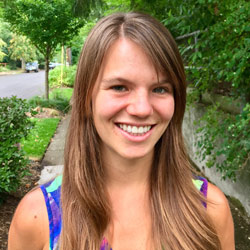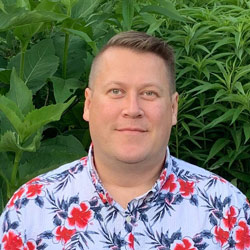The Medical Laboratory Technology (MLT) program provides students with the knowledge and skills to analyze bodily fluids and tissues to aid in diagnosing, treating, and monitoring patients' health.
MLT students focus on learning the major areas of medical laboratory sciences, such as sample collections, immunology, body fluid analysis, hematology, chemistry, microbiology, and blood bank. The hybrid theory courses combine online learning with limited in-class attendance. In addition to the theory courses, students perform 150 laboratory hours on campus focusing on skills needed for entry-level competency. During the final semester of the program, students are immersed in a 480-hour clinical performing sample analyses in a modern hospital laboratory.
The program is a two-and-one-half-year program of study. Graduates of the program are awarded an Associate of Applied Science (AAS) degree in Medical Laboratory Technology from CMU. Upon graduation, students are eligible to take nationally recognized certification examinations and are immediately eligible for employment.
Advising information
Contact Tracy Matthews, Medical Laboratory Technology Program Coordinator, at [email protected] if an advising appointment is desired.
To fulfill the requirements of the AAS degree, students must complete 71 credit hours. The first year of the program includes prerequisite foundation coursework in math, chemistry, and biology, as well as Essential Learning (general education) coursework. Students apply to the MLT program in March of the first year. Not all coursework needs to be completed at the time of application, although students must complete all prerequisite coursework prior to starting the program. The second year of the program begins in the fall semester with introductory medical laboratory concepts and skills, followed by more in-depth courses in the spring semester. Students complete a 600-hour hospital laboratory internship during the final semester of the program in the fall. Due to the progressive instructional design, all MLT program courses are taken concurrently each semester and in sequence.
Academic Requirements for Associate of Applied Science in Medical Laboratory TechnologyMedical laboratory technicians work mainly in healthcare settings, primarily hospital laboratories. Other healthcare settings include clinic laboratories and private office laboratories where the MLT may also draw blood from patients for testing. Other career opportunities that utilize the knowledge and skills of a MLT involve working in pharmaceutical manufacturing, biomedical research labs, crime labs, blood banks and large reference labs.
Application Information
The priority application deadline is March 1. Additional applications may be submitted until July 1 for consideration if space is available. Please review the Application Checklist first before completing your application.
Accreditation
The CMU Medical Laboratory Technology program is accredited through the National Accrediting Agency for Clinical Laboratory Sciences (NAACLS), which is an independent nonprofit accrediting agency that ensures the quality and integrity of educational programs that prepare professionals to work in the medical laboratory.

NAACLS Address: 5600 N. River Rd, Suite 720, Rosemont IL 60018-5119. Phone: 970-248-1546
Program Completion
Students enrolled in the program's second half in 2021-2023 who graduated.
Pass Rate
Graduates from 2021-2023 who passed the Board of Certification (ASCP) on their first attempt.
Employment
Graduates from 2021-2023 employed or continued their education within one year of graduation.
College to Career
As a student at CMU, Adriana Ramos Gonzalez was immersed in a medical laboratory and put the theory learned in class, into practice. This experience prepared her for her current position as a Medical Lab Technician at St. Mary's Hospital.
More about this graduate

